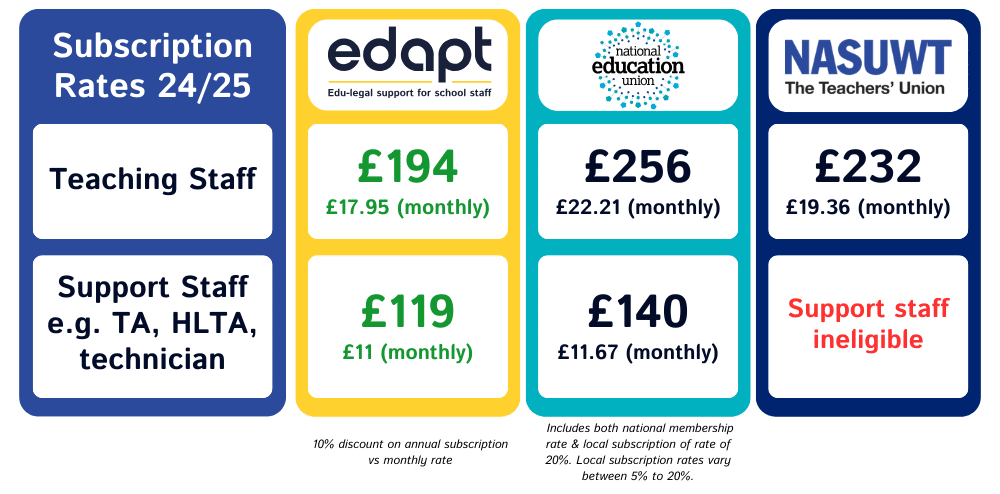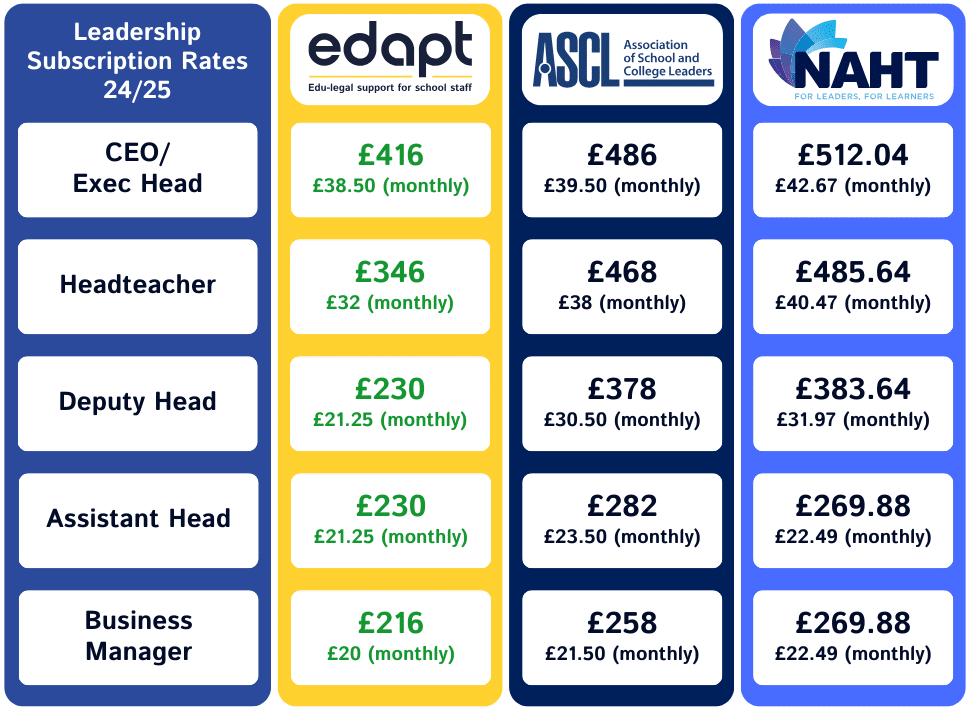Which teaching union to join?
Which teaching union to join is a question which many school staff ask when entering the profession. As former teachers and school leaders ourselves we are well aware of the high-risk nature of teaching as a front-line role.
The risks of allegations from pupils, parents and other members of staff, the threat of restructuring and redundancies, disputes about pay, grievances and many more employment-related issues are the reasons why hundreds of thousands of school staff sign-up for professional support. In fact 75% say this is the main reason why they join a teaching union or alternative like Edapt (Teacher Tapp 2023).
It’s not just serious cases where professional support can be helpful, everyday concerns like checking employment contracts or working hours can also benefit from expert advice.
However, teaching unions and alternatives are not able to support teachers who do not have an active membership with the organisation. It’s a bit like trying to buy breakdown cover from the AA but only after your car has broken down, that’s not how it works.
So given the high incidence of potential issues and also their unpredictable nature our advice is to make sure that you JOIN SOMEBODY, whether that be a traditional teaching union or an alternative like Edapt.
If you are new to teaching as a trainee or ECT it is a no brainer as memberships and subscriptions are either free or heavily discounted.
So, what options are available to teachers and how do you know which teaching union to join? Which option will be best for you and your individual situation?
What options are available to teachers?
Currently there are five organisations that specialise in supporting teachers and school staff:
The NEU, NASUWT, ASCL and NAHT are trade unions whereas Edapt is an independent organisation. It is worth noting that ASCL and NAHT are leadership unions aimed at supporting staff in senior positions.
Trade unions are a specific legal entity and serve three main functions:
To campaign and lobby the government on issues relevant to their members. This often includes collective bargaining and industrial action related to pay and working conditions.
Offer professional development opportunities and training.
Provide legal and employment support and protection to members.
Edapt, is not a trade union and focuses solely on providing this final function; high-quality employment support for teachers and other staff working in schools. Whilst many educators want to engage with the full union offering such as national campaigns, others view membership in a similar way that they might purchase breakdown assistance for their car; they are reassured to know that it is there but hope never to have to use it.
In other words, they only want the legal support and protection function and may find other ways to engage with education policy or find other sources for professional development. These are some of the reasons why they may choose to join an alternative like Edapt as they only focus on the element that they need.
How does Edapt compare to the teaching unions?
In many ways Edapt and teaching unions have more in common than separates them in that they all have the best interests of teachers and school staff at the heart of what they do and work hard to protect their interests. However, there are some key differences in how they try to deliver those outcomes. The sections below explain some of these more nuanced differences:
Established as traditional trade unions with history dating back to the 1870s. They represent teachers’ rights and campaign for improved pay, working conditions, educational and other policy changes.
Founded by teachers in 2012 to offer non-political, legal protection and support services tailored for educators, focusing on individual needs rather than collective bargaining.
The NEU and NASUWT are the two largest unions whilst ASCL and NAHT smaller (approx 10% of the size).
The NEU, NASUWT and ASCL cover teachers UK wide whilst the NAHT supports leaders in England, Wales and Northern Ireland.
.
Whilst not as large as the longer established unions, Edapt has grown quickly and actively supports thousands of teachers and school staff across England and Wales.
The NEU supports teachers, school leaders and also support staff.
NASUWT only supports teachers and school leaders.
ASCL and the NAHT support school leaders and business managers.
.
.
Edapt supports anybody working in schools and further education colleges. This includes teachers, lecturers, school leaders, teaching assistants, support staff and business managers.
The teaching unions are registered trade unions with the ability to collectively bargain on behalf of their members. They can ballot members for industrial action including strikes. However, memebrs are only allowed to take part in the industrial actions voted for by their union and cannot join other unions’ actions separately unless they relinquish their current union membership or join the other union.
.
.
Not a trade union and as a result Edapt cannot ballot members for industrial action. However, this means that as non-trade union members, Edapt subscribers are able to join other unions’ industrial action with the same legal protections as that of the striking unions’ members without having to join another union or relinquish their Edapt subscription.
Actively involved in campaigning on a variety of issues. Some unions will tend to only focus on educational issues such as curriculum, Ofsted reform, pay and conditions etc. Others have stronger alignment with the broader global trade union movement and may also have campaigns which are more global in nature e.g. Israel/Palestine, LGBTQ+ rights, anti-racism etc.
.
.
Non-campaigning. Whilst the founders and employees have individual views on education and wider global issues, these are expressed privately. Edapt as an organisation does not have an opinion on any issue, takes a neutral stance in all domains and does not attempt to speak on behalf of its members.
The NEU and NASUWT maintain political funds of approx £1m and £750k that can be used to donate to political causes and wider issues. Members can withdraw their permission to donate to these funds. These funds can be used to make donations to causes that the union is sympathetic to. In its 2023 annual report, the NEU declared expenditure of £285k from its political fund.
ASCL and NAHT do not maintain political funds.
Edapt does not have a political fund nor makes any donations to any other organisation. It remains entirely apolitical, neutral and independent, ensuring that all resources are directed towards supporting members’ legal and professional needs.
The NEU and NASUWT have a significant reliance on lay members and volunteers (often other teachers) for local representation and initial support. Teachers typically contact their local representatives as an initial pillar of support. ASCL and NAHT have a more centralised approach relying less on lay members/volunteers and instead have established support teams.
Edapt exclusively utilises professional caseworkers, ensuring members receive expert advice and representation from the outset. Initial contact (often by direct phone) is to a centralised support team who then travel to meet members for local face to face support when needed.
Only NAHT have a mental health offering with a specialist support line in partnership with the charity Education Support. NEU, NASUWT and ASCL do not offer specialist mental health support.
Edapt offers a specialist 24/7 mental health support line staffed by mental health professionals and counsellors. Free in-person follow up support is also available to members.
Unions typically provide initial in-person support through local school representatives or other officials for disciplinary or grievance meetings.
Edapt provides in-person support from professional caseworkers with legal expertise, ensuring members are fully supported in all disciplinary and grievance processes.
Unions offers various CPD (Continuing Professional Development) opportunities. These may be related to classroom practice or may also be aligned with wider union campaigns and educational reform. These are typically free for members and funded from existing membership fees.
No CPD offering. Focus is purely on professional support.
This varies by union. NEU/NASUWT local reps may run in-school meetings that members can attend. Some send out regular physical magazines, others opt for digital updates primarily around key events, campaigns, and industrial action. During an active campaign, unions may also contact members regularly by text message and/or email to encourage engagement in ballots or rallies.
Edapt limits communication to one optional monthly email which provides updates on key issues in the sector. Regular blogs and support articles are posted online for access as and when required.
How do they compare in price?
The cost of any union or alternative membership will depend on your role in school and hours worked. All organisations offer prorated discounts for those working part-time hours.
The tables below give an overview of current pricing models for the 2024/25 academic year:

How do I choose the best fit for me?
Surprisingly, there are no comparison websites such as GoCompare or Confused.com which collates the monthly subscription costs for different teaching roles, regional fees, satisfaction ratings and opening hours for different organisations.
How do new and existing teachers decide from a variety of options available?
From our own experiences as school teachers it can include the following factors:
- Shared values, vision and ideology of the education system. Opinions differ as to what issues teaching unions should or shouldn’t be engaged in.
- The organisation’s stance on issues that are or are not important to them.
- Feedback and word of mouth from teachers in the same school or department.
- How well people know their local representative (if there is one) and whether they trust in their support.
- Monthly and annually pricing, special offers and affiliate deals.
- Testimonials from existing subscribers or members.
- Quality of outcomes when employment is threatened or terminated. For example, when threatened with redundancy what outcome will your organisation be able to secure?
- Political or apolitical stance. Some teachers and school staff want high-quality employment support without being balloted for strike action or their fees going towards political lobbying
- Tone of voice, design aesthetics and accessibility when updating details online or raising a case and talking to a human being, with education knowledge, over the phone.
If you want to find out more about Edapt or have any queries, we would be more than happy to answer any questions you have. As all good teachers know, there are no silly questions and we always enjoy speaking to colleagues. You can call us on 0203 475 3998, use our live chat function (in the bottom right of the screen) or email us on info@edapt.org.uk. Whichever one you choose, a friendly member of the team will be able to assist.
If you want to go straight to the start of the joining process, just click the button below.
Subscribe to Edapt today from as little as £8.37 per month to get access to high quality edu-legal support services to protect you in your teaching and education career.
SubscribeLatest Support Articles
Our support articles provide up to date advice on a wide range of topics including pay and conditions, maternity and paternity, dealing with allegations and staying safe online.


Hi
How can I transfer from
A union that I am currently a member of. I’m only in the union for legal support services and am not interested in their politics